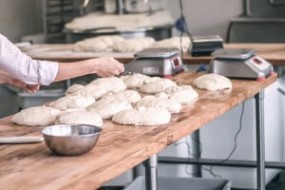Working in the Food Industry
Foody hygiene and safety, food intolerances and allergies, kitchen roles, knife selection and menu planning are part of this comprehensive food industry course.
In this course, you will learn how food safety and hygiene govern everything that you will do within the catering industry. This type of work includes preparing food, the aftercare of cooked food, being aware of special diets and temperature control. The course also focuses on personal development in the workplace. Learn to be aware of each team member’s responsibility to keep a kitchen running smoothly, swiftly and efficiently.
What You Will Learn In This Free Course
Food Safety in Catering
Food safety and hygiene govern everything that you will do within the catering industry. The following module will explain in greater detail the ways and means to keep food free from contamination. This will include preparation of raw food, aftercare of cooked food, temperature control and a guide to the types of bacteria that can present be in food.
HACCP and Cross Contamination
HACCP stands for Hazard Analysis Critical Control Point. The HACCP plan, that every food-related business should have, details the business’s individualised approach to handling their potential hazards. This includes monitoring and record-keeping which someone with good attention to detail should be in charge of. This module will also cover cross-contamination and the way that you as a food handler can minimise the risk of bacteria entering food that consumers will eat,
Developing Skills
Catering and hospitality are one of the biggest industries in the world. In the UK alone, it provides employment for 9% of the population. A key point when applying for a job and maintaining a respected work practice is keeping excellent personal hygiene as well as a friendly personality. Personal development means setting goals and never being afraid to ask questions, this kind of focus in the workplace leads to good and efficient employees.
First Assessment
This initial assessment enables you to review your learning, so you can determine your knowledge and understanding of the following modules: Food Safety in Catering, Developing Skills for Employment in the Catering and Hospitality Industry.
Healthier Foods and Special Diets
Understand what it means to prepare healthy food and how crucial it is to have a balanced diet that contains fats, carbohydrates, and protein. We have been taught, since childhood, that ?fats? are bad for us, but in reality, our bodies need them to function correctly. It is essential to grasp how this can affect people who are intolerant to a specific type of food, have poor lifestyle choices, or severe health issues. By applying these practices, you can keep your customers happy.
Catering Operations, Costs and Menu Planning
A kitchen where order does not exist is a complete disaster. Having order within any business is crucial, but more so in a catering environment. Being aware of each team member’s responsibility will help keep a kitchen running smoothly, swiftly & efficiently. Another vital skill for chefs to know is how to manage expenses. If done correctly, a higher rate of gross profit will increase. When creating a menu, it is essential to consider your market, competition, dietary requirements and locality.
Basic Knife Skills and Techniques
A knife is a crucial piece of equipment in a kitchen. One of the most important factors to consider when choosing the right knife for you is not how expensive it is, but how comfortable it feels in your hand and what you will be doing with it. In this module, we will also learn how to take care of knives so its life can be prolonged in the kitchen.
Second Assessment
This initial assessment enables you to review your learning, so you can determine your knowledge and understanding of the following modules: Healthier Foods and Special Diets, Catering Operations, Costs and Menu Planning, Basic Knife Skills and Techniques.
Course assessment
User Reviews
Be the first to review “Working in the Food Industry”
You must be logged in to post a review.







There are no reviews yet.